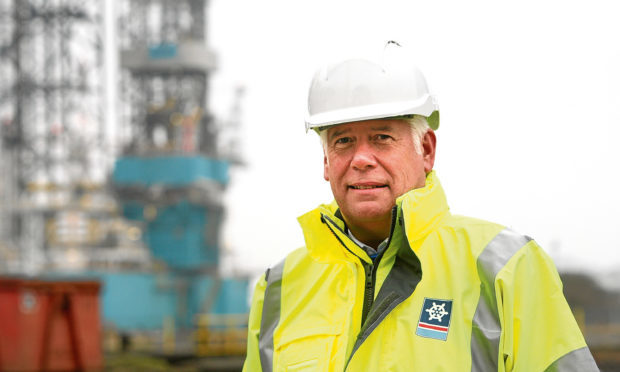The boss behind Dundee’s decommissioning jobs drive has accused the Scottish Government of endangering the city’s efforts by “throwing taxpayers’ money” at their rivals.
The SNP administration is set to announce a major investment in Shetland’s Dales Voe after designating it the “optimal UK location” for breaking up North Sea platforms.
Callum Falconer, the chief executive of Dundeecom, a public-private partnership set up to create the new decommissioning industry in the city, launched a scathing attack on ministers, saying the city’s bid “may well be compromised by this uneven playing field that is being created by the government”.
“We are really creating a decommissioning-ready city in Dundee and this is all on the back of private enterprise,” he told The Courier.
“Meanwhile in Shetland the government are throwing taxpayers’ money at other facilities and showcasing them as the place to go.
“That is the uneven playing field that I am talking about.
“Why are the government showcasing Shetland when we are trying to do business in Dundee?
“Private enterprise is being compromised by frivolous spending of public money on a facility that probably won’t return anything like the return it will need to justify this huge investment.
“Everybody in Dundee is investing their time and their money and then what happens, the government and the Oil and Gas Authority go off on their own little frolic – and say ‘actually this (Shetland) is where you should be doing your businesses’.”
Decommissioning involves dismantling oil and gas installations and industry bosses predict it will bring hundreds of jobs to the city.
The emerging North Sea sector could be worth £40 billion in total up until 2040, although most of that will be for offshore work such as removing pipelines.
Nicola Sturgeon’s programme for government published last week promised to establish a deep water port in Scotland to compete with European facilities.
It read: “Our 2018 deep water feasibility study has identified Dales Voe in Shetland as the optimal UK location and we will continue to work collaboratively with the UK Government, the port, and industry to move work forward to create a facility and unlock the business opportunities this will provide.”
An Aberdeen-based decommissioning analyst, who wanted to remain anonymous, said the announcement “confirms Dundee’s marginal status” as a decommissioning base for the major fields in the northern North Sea, although it “may still have a role” for the central North Sea.
Energy economist Tony Mackay, a former Aberdeen professor, said missing out on the designation is “not necessarily bad news for Dundee”.
“There are other decom contracts which Dundee could win,” Mr Mackay said.
“The city has two big advantages over Shetland in that it has a large, skilled local labour force and local markets for the decommissioned equipment.”
Stuart Wallace, from Forth Ports, said the Port of Dundee is “well positioned” for taking decom work and there is “already job creation” with businesses based on site.
A Scottish Government spokesman said: “We support the ambitions of Dundee as a location for decommissioning.
“The market is diverse and includes smaller platforms, subsea infrastructure and floating infrastructure that does not require a deep water port.
“Dundee is well placed to compete for this work.
“A deep water port, acting as a transfer hub, may even benefit Dundee if the Scottish market works collaboratively as we strongly support.”










